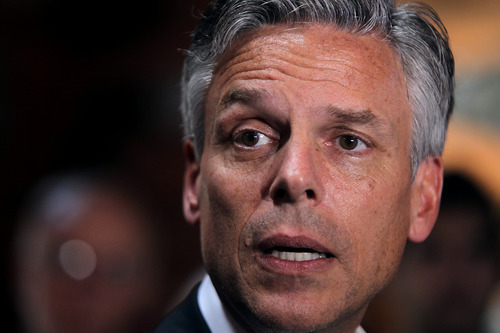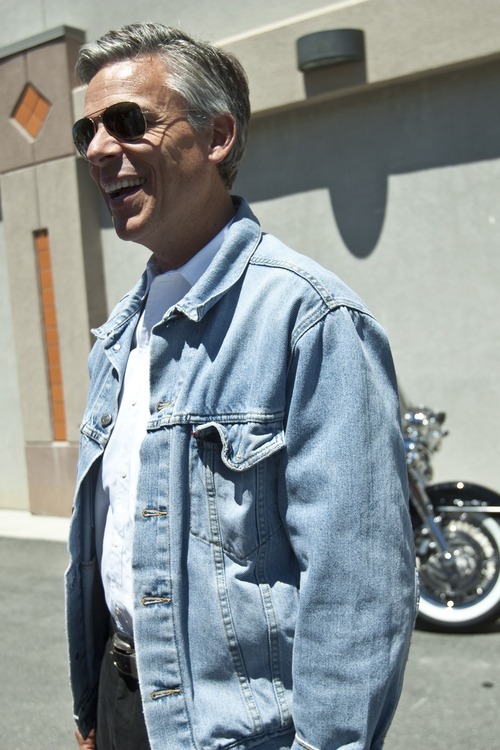This is an archived article that was published on sltrib.com in 2012, and information in the article may be outdated. It is provided only for personal research purposes and may not be reprinted.
Washington • Though touted as a possible third-party presidential candidate, former Utah Gov. Jon Huntsman said Friday he's "not interested" in running again this year for the White House.
And the former Republican hopeful said in a wide-ranging interview Friday with The Salt Lake Tribune that he's also ruling out a bid against Sen. Orrin Hatch, though Huntsman thinks the long-serving senator should step aside and quit "pandering."
Rumors of Huntsman accepting the possible nomination by the Americans Elect movement — which is using an online system to pick its candidate and hopes to be on all 50 state ballots in the fall — are just that, he said: rumors. Huntsman, though, expects to see the group become a force in the future.
"I'm not going to engage in hypotheticals, but I have absolutely no plans, no thought that I would do anything like that," Huntsman said when asked if he'd be on that ticket or accept any other third-party nomination. "I am absolutely not interested in doing it. … [I have] zero interest this election cycle."
During the face-to-face interview at his Washington home, Huntsman told The Tribune he's settling back into private life after his short-lived presidential run. He's joined a few corporate boards, is heading his family's cancer foundation and takes an occasional speaking gig.
Politics, though, are out — for now.
"This cycle was not our cycle," Huntsman said, looking relaxed in jeans, sneakers and an untucked, button-down shirt. "Will it be in the future? I don't know. The rhythms, the cycles of politics will determine that."
A future White House run is possible — "politics is serendipity," he says — though he's not interested in running for the Senate from Utah in the meantime.
"I've had a lot of people approach us about that possibility," he said, noting they urged him to run as a Republican against Hatch, who is seeking a seventh term.
"I'm a term-limits guy, and it would have been great for Orrin to recognize his terrific service and maybe open up something for the next generation," Huntsman said. "He wishes to continue forward — that's his decision."
Still, Huntsman said he's watched Hatch's recent rhetoric and finds it disheartening to see the senator who once crossed the aisle to hammer out major legislation, like the State Children's Health Insurance Program, take a sharp turn away from compromise.
"I'm disappointed with the trend toward pandering, particularly in light of the serious policy issues that he was the author of that I think contributed to strong bipartisan outcomes," Huntsman said, mentioning SCHIP, immigration and budget issues. "Pandering doesn't get us, in today's environment, where we need to be. It may get people politically where they need to be, but it doesn't get our country where it needs to be."
Hatch's campaign manager, David Hansen, said Huntsman is a "private citizen entitled to his opinion" but that Hatch isn't pandering.
"The senator has run a very straightforward campaign," Hansen said.
Huntsman noted that he sees presidential candidate Mitt Romney — whom Huntsman endorsed when he ended his bid in January — also doing some pandering but "that'll disappear after the election."
Huntsman declared on MSNBC's "Morning Joe" that he's "not a surrogate for anybody" and even threw out the idea of a third-party entrance to the presidential race. But the former Utah governor says he still backs Romney and doesn't believe his endorsement was "tepid."
"I thought it was adequate," he said. "I believe then as I do today that he's best suited to deal with our economy, which is our No. 1 problem. He's got the tools; he's got the temperament; he's got the experience."
While Huntsman ended his campaign within days of a disappointing third-place finish in New Hampshire, he isn't suggesting that contenders Newt Gingrich or Rick Santorum necessarily have to drop out now that it's become mathematically problematic for either of them to win the nomination.
"On one hand, keeping a rigorous, competitive debate alive in our time of need is a virtue in today's race. On the other hand, it increases the risk for the ultimate nominee — presumably, Governor Romney — to make additional mistakes," Huntsman said.
Without mentioning names, Huntsman also noted that some people still in the race may be staying in to push their own commercial appeal for later books and speaking engagements.
The former candidate says he'll likely release the two delegates he won in New Hampshire to Romney, and he's not eyeing a big speaking role at the Republican National Convention.
He noted that the Republican National Committee uninvited him to a Florida event after he called for a third-party candidate on MSNBC.
He's not backing off that point, adding that people are tired of the "same-old [Republican/Democrat] duopoly, spending more money on opposition research than on real ideas and visions for the country."
Americans Elect may take a few election cycles to catch on, Huntsman said, but the approach is "revolutionary."
"The key here, which I think is great for politics, is to get more people involved, to allow more people access to politics," Huntsman said. "I believe at some point it's going to be very viable."
Perhaps then Huntsman will be interested in such a candidacy.





